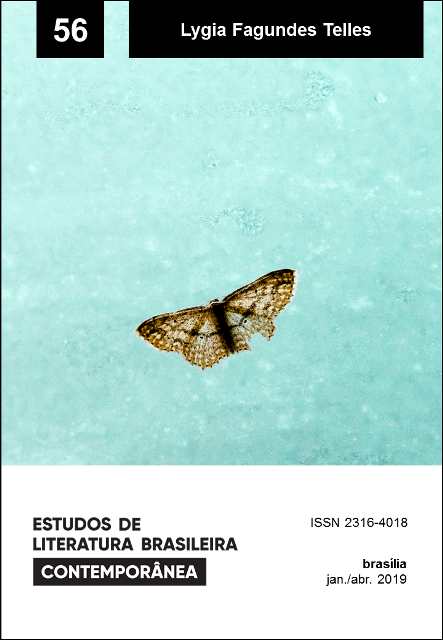Love, humor and horror in the fiction of Lygia Fagundes Telles
DOI:
https://doi.org/10.1590/2316-4018562Keywords:
Lygia Fagundes Telles, Fantastic literature, Political engagementAbstract
This article intends to analyze the narrative work of Lygia Fagundes Telles through the use of the fantastic as a device present in most of her literary production. Without choosing between political engagement (especially during and after the period of military dictatorship) and the investigation of the unconscious, Fagundes Telles retains both as constitutive elements of her work. This duality is studied in the story “Seminário dos ratos”, where irony is combined with ideological critique, identifying within the story one of the main characteristics of her literature.
Downloads
References
ANDRADE, Carlos Drummond de (2012). Poesia 1930-62. Ed. Crítica. Organização de Júlio Castañon Guimarães. São Paulo: Cosac Naify.
BERGSON, Henri (1919). L’energie spirituelle. Paris: PUF.
BOLOGNA, Corrado (1992). Flatus vocis. Bologna: Il Mulino.
BOMPIANI, Ginevra (2011). L’attesa. Milano: Feltrinelli.
CHRÉTIEN DE TROYES (1969). Lancelot ou le chevalier de la charrete. Edição de Mario Roques. Paris: Honoré Champion.
FONSECA, Rubem (1992). A arte de andar pelas ruas do Rio de Janeiro. In: FONSECA, Rubem. Romance negro e outras histórias. São Paulo: Companhia das Letras.
FOUCAULT, Michel (2009). La vita degli uomini infami. Bologna: Il Mulino. Edição original: La vie des hommes infâmes. In: FOUCAULT, Michel. Dits et écrits. Paris: Gallimard, 1994. v. III.
FREUD, Sigmund (1919/1982). Das Unheimliche. Fischer: Frankfurt am Main.
IMS ”“ INSTITUTO MOREIRA SALLES (1998). Cadernos de Literatura Brasileira, n. 5: Lygia Fagundes Telles. São Paulo: IMS.
JANKÉLÉVITCH, Vladimir (1977). La mort. Paris: Flammarion.
LÉVINAS, Emmanuel (2002). La mort d’autrui et la mienne. In: LÉVINAS, Emmanuel. Dieu, la mort et le temps. 2. ed. Paris: Grasset.
LISPECTOR, Clarice (1979). A paixão segundo G.H. 7. ed. Rio de Janeiro: Nova Fronteira.
MACHADO, Dyonelio (1997). Os ratos. 30. ed. São Paulo: Ática.
PAES, José Paulo (1998). Ao encontro dos desencontros. In: IMS ”“ INSTITUTO MOREIRA SALLES. Cadernos de Literatura Brasileira, n. 5: Lygia Fagundes Telles. São Paulo: IMS.
RÉGIS, Sônia (1998). A densidade do aparente. In: IMS ”“ INSTITUTO MOREIRA SALLES. Cadernos de Literatura Brasileira, n. 5: Lygia Fagundes Telles. São Paulo: IMS.
SANTIAGO, Silviano (1998). A bolha e a folha: estrutura e inventário. In: IMS ”“ INSTITUTO MOREIRA SALLES. Cadernos de Literatura Brasileira, n. 5: Lygia Fagundes Telles. São Paulo: IMS.
TELLES, Lygia Fagundes (1970/2009). Antes do baile verde. São Paulo: Companhia das Letras.
TELLES, Lygia Fagundes (1980). A disciplina do amor. 4. ed. Rio de Janeiro: Nova Fronteira.
TELLES, Lygia Fagundes (1981). Mistérios. Rio de Janeiro: Nova Fronteira.
TELLES, Lygia Fagundes (1984). Seminário dos ratos. 7. ed. Rio de Janeiro: Nova Fronteira.
TELLES, Lygia Fagundes (1991). A estrutura da bolha de sabão. Rio de Janeiro: Nova Fronteira.
TELLES, Lygia Fagundes (1995). A noite escura e mais eu. Rio de Janeiro: Nova Fronteira.
TELLES, Lygia Fagundes (2002). Durante aquele estranho chá: perdidos e achados. Rio de Janeiro: Rocco.
TELLES, Lygia Fagundes (2011). Passaporte para a China. São Paulo: Companhia das Letras.
VALÉRY, Paul (1973). Cahiers, I. Paris: Gallimard.
VIRNO, Paolo (1999). Il ricordo del presente: saggio sul tempo storico. Torino: Bollati Boringhieri.
WITTGENSTEIN, Ludwig (1953/1967). Ricerche filosofiche. Torino: Einaudi.
Published
How to Cite
Issue
Section
License
Authors who publish in this journal agree to the following terms:
a) The authors maintain the copyright and grant the journal the right of first publication, the work being simultaneously licensed under the Creative Commons Attribution License-Non Commercial 4.0 which allows the sharing of the work with acknowledgment of the authorship of the work and publication this journal.
b) Authors are authorized to enter into additional contracts separately, for non-exclusive distribution of the version of the work published in this journal (eg publish in institutional repository or as a book chapter), with authorship recognition and publication in this journal.
c) Authors are allowed and encouraged to publish and distribute their work online (eg in institutional repositories or on their personal page) after the editorial process, as this can generate productive changes, as well as increase the impact and citation of published work (See The Effect of Free Access).
d) The authors of the approved works authorize the magazine to, after publication, transfer its content for reproduction in content crawlers, virtual libraries and the like.
e) The authors assume that the texts submitted to the publication are of their original creation, being fully responsible for their content in the event of possible opposition by third parties.


